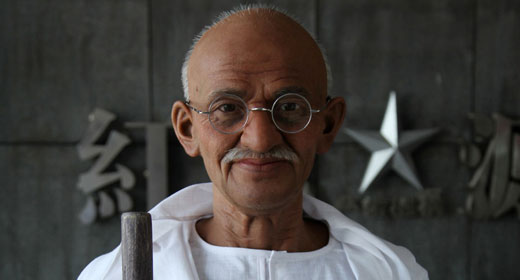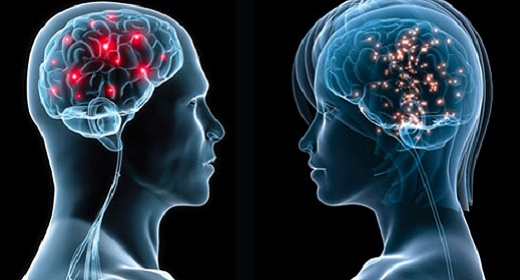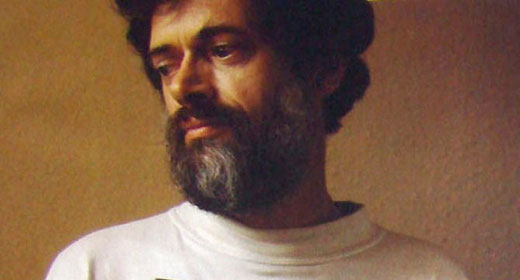Awaken: It is an honor to spend this time with you. I would like to start with the rather profound notion of what it means to awaken…

Is this the same as what you mean, when you speak of enlightenment or self-realization? And also, is this our ultimate purpose?
Gandhi: Man’s ultimate aim is the realization of God. And all his activities, social, political, religious, have to be guided by the ultimate aim of the vision of God. The immediate service of all human beings becomes a necessary part of the endeavor, simply because the only way to find God is to see Him in his creation and be one with it. This can only be done by service of all.
I am a part and parcel of the whole and I cannot find Him apart from the rest of humanity. My countrymen are my nearest neighbors. They have become so helpless, so resourceless, so inert that I must concentrate myself on serving them. If I could persuade myself that I could find Him in a Himalayan cave, I would proceed there immediately. But I know that I cannot find Him apart from humanity.
Awaken: It seems that your abiding and steady faith in God guides your work every step of the way… how did you come to such a strong conviction and belief in His/Her existence?
Gandhi: I am surer of His existence than of the fact that you and I are sitting in this room. I can also testify that I may live without air and water but not without Him. You may pluck out my eyes, but that cannot kill me. You may chop off my nose, but that will not kill me. But blast my belief in God, and I am dead. You may call this a superstition, but I confess it is a superstition that I hug, even as I used to do the name of Rama in my childhood when there was any cause of danger or alarm. That was what an old nurse had taught me.
Awaken: You mention Rama… Through your work many people in the west have become interested in Hindu teachings and philosophy, but are confused by the multiplicity of Gods. What or who… is Rama… Is he God? What… or, Who is God? And are there truly many? Or are they just aspects of the one?
Gandhi: God is certainly One. He has no second. He is unfathomable, unknowable and unknown to the vast majority of mankind. He is everywhere. He sees without eyes and hears without ears. He is formless and indivisible. He is uncreated, has no father, mother or child; and yet He allows Himself to be worshipped as father, mother, wife and child. He allows Himself even to be worshipped as stock and stone, although He is none of these things. He is the most elusive. He is the nearest to us, if we would but know the fact. But He is farthest from us when we do not want to realize His omnipresence.
I dispute the description that Hindus believe in many Gods and are idolaters. They do say that there are many gods, but they also declare unmistakably that there is one God, the God of gods. It is, not therefore, proper to suggest that Hindus believe in many gods. They certainly believe in many worlds. Just as there is a world inhabited by men and another by beast, so also, is there one inhabited by superior beings called gods, whom we do not see but who nevertheless exist.
The whole mischief is created by the English rendering of the word deva or devata, for which you have not found a better term than “God”. But God is Ishwara, Devadhideva, God of gods. So you see, it is the word “God” used to describe different divine beings that has given rise to such confusion. I believe that I am a thorough Hindu, but I never believed in many gods. Never even in my childhood did I hold that belief and no one ever taught me to do so.
Awaken: And so, the many Gods and many names of Gods that we associate with Hinduism are really just aspects of that one, which you speak of?
Gandhi: There is only one omnipotent and omnipresent God. He is named variously and we remember Him by the name which is most familiar to us. Each person can choose the name that appeals most to him. Ishwara, Allah, Khuda, God… all mean the same.
God has a thousand names, or rather, He is nameless. We may worship or pray to Him by whichever name that pleases us. All worship the same Spirit, but as all foods do not agree with all, all names do not appeal to all. Each chooses the name according to His associations and He, being the Indweller All-Powerful and Omniscient, knows our inmost feelings and responds to us according to our needs.
In my opinion, Rama, Rahaman, Ahurmazda, God or Krishna, are all attempts on the part of man to name that invisible Force… Man can only conceive of God within the limitations of his own mind. What matters, then, whether one man worships God as a person and another as a force? Both do right according to their understanding. One need only remember that God is the Force among all the forces. All other forces are material. But God is the Vital Force or Spirit which is all-pervading, all-embracing and therefore beyond human comprehension.
Awaken: if I may… this idea is similar to the western term, pantheism, which captures a similar idea, that God is everywhere and is found within us, and in all of nature…
Gandhi: God is an Unseen Power residing within us. There are many powers lying hidden within us, and we discover them by constant struggle. Even so, we may find this Supreme Power, if we make diligent search with the fixed determination to find Him.
My God does not reside above. He has to be realized on earth. He is here, within you, within me. He is omnipotent and omnipresent. You need not think of the world beyond. If we can do our duty here, the beyond will take care of itself. To me, God is Truth and Love. God is ethics and morality; God is fearlessness. God is the source of Light and Life, and yet He is above and beyond all these. God is conscience. He is even the atheism of the atheist. For in His boundless love, God permits the atheist to live. He is the searcher of the hearts. He knows us and our hearts better than we do ourselves… He is personal God to those who need His personal presence. He is embodied to those who need His touch. He is the purest Essence. He is, to those who have faith. He is all things to all men.
There are innumerable definitions of God, because His manifestations are innumerable.
God is not some person outside ourselves or away from the universe. He pervades everything and is omniscient as well as omnipotent. He does not need any praise or petitions. Being immanent in all beings, He hears everything and reads our inner-most thoughts. He abides in our hearts and is nearer to us than the nails on our fingers.
God is then not a person. He is the all-pervading, all-powerful Spirit. Any one who hears Him in his heart has access to a marvelous force or energy, comparable in its results to physical forces, like steam or electricity, but much more subtle.
Awaken: What a blessing to have felt this force in your own heart, which I imagine you have?
Gandhi: I have no special revelation of God’s will. My firm belief is that He reveals Himself daily to every human being, but we shut our ears to the still small Voice. We shut our eyes to the Pillar of Fire in front of us. I realize His omnipresence.
Awaken: And so, with all of that explained about the proper understanding of deities, how do you speak to God and address your own devotions?
Gandhi: I worship God as Truth only. I have not yet found Him, but I am seeking after Him. I am prepared to sacrifice the things dearest to me in pursuit of this quest. Even if the sacrifice demanded be my very life, I hope I may be prepared to give it. But as long as I have not realized this Absolute Truth, so long must I hold by the relative truth as I have conceived it.
That relative truth must, meanwhile, be my beacon, my shield and buckler. Though this path is straight and narrow and sharp as the razor’s edge, for me, it has been the quickest and easiest. Even my Himalayan blunders have seemed trifling to me because I have kept strictly to this path. For the path has saved me from coming to grief, and I have gone forward according to my light. Often in my progress I have had faint glimpses of the Absolute Truth, God, and daily the conviction is growing upon me that He alone is real and all else is unreal.
Awaken: Could you elaborate on what you mean by truth?
Gandhi: My uniform experience has convinced me that there is no other God than Truth… The little fleeting glimpses… that I have been able to have of Truth can hardly convey an idea of the indescribable luster of Truth, a million times more intense than that of the sun we daily see with our eyes. In fact, what I have caught is only the faintest glimmer of that mighty effulgence. But this much I can say with assurance as a result of all my experiments, that a perfect vision of Truth can only follow a complete realization of Ahimsa.
Awaken: Ahimsa I know to mean non-violence, to refrain from harming other living things… and so, this is the principle that has guided your work and your personal way of living, including your vegetarian diet and methods of activism?
Gandhi Not to hurt any living things is no doubt a part of Ahimsa. But it is its least expression. The principle of Ahimsa is hurt by every evil thought, by undue haste, by lying, by hatred, by wishing ill to anybody. It is also violated by our holding on to what the world needs. But the world needs even what we eat day by day.
In the place where we stand, there are millions of micro-organisms to whom the place belongs, and who are hurt by our presence there. What should we do then? Should we commit suicide? Even that is no solution, if we believe, as we do, that so long as the spirit is attached to the flesh, on every destruction of body it weaves for itself another. The body will cease to be only when we give up all attachment to it.
Awaken: Just to follow up on what you were saying a moment ago… that “truth can only follow the complete realization of ahimsa…” can you clarify how this non-violent lifestyle relates to truth?
Gandhi: This freedom from all attachment IS the realization of God as Truth. Such realization cannot be attained in a hurry. The body does not belong to us. While it lasts, we must use it as a trust handed over to our charge. Treating in this way the things of the flesh, we may one day expect to become free from the burden of the body. Realizing the limitations of the flesh, we must strive day by day towards the ideal with what strength we have in us. It is perhaps clear from the foregoing, that without Ahimsa it is not possible to seek and find Truth.
Awaken: If I understand you correctly, non-violence serves as a kind of footstep to the realization of truth…
Gandhi Ahimsa and Truth are so intertwined that it is practically impossible to disentangle and separate them. They are like the two sides of a coin, or rather of a smooth unstamped metallic disc. Who can say, which is the obverse, and which is the reverse? Nevertheless, Ahimsa is the means; Truth is the end. Means to be means must always be within our reach, and so Ahimsa is our supreme duty. If we take care of the means, we are bound to reach the end sooner or later. When once we have grasped this point, final victory is beyond question. Whatever difficulties we encounter, whatever apparent reverses we sustain, we may not give up the quest for Truth which alone is, being God Himself.
Awaken: We have also spoken to your teacher, Paramahansa Yogananda, with whom you requested initiation into Kriya Yoga. As other mystics, such as St. Teresa of Avila, have done, he spoke of the importance of humility on the spiritual path. Could you say a few words about this?
Gandhi: Truth without humility would be an arrogant caricature. He who wants to practice truth knows how hard it is. The world may applaud his so-called triumphs. Little does the world know his falls. A truthful man is a chastened being. He has need to be humble.
A man who wants to love the whole world, including one who calls himself his enemy knows how impossible it is to do so in his own strength. He must be as mere dust before he can understand the elements of Ahimsa. He is nothing if he does not daily grow in humility as he grows in love…. And no one can see God face to face who has aught of the I in him. He must become a cypher if he would see God. Who shall dare say in this storm-tossed universe, “I have won?”
God triumphs in us… What is true of the physical world is true of the spiritual. If in order to gain a worldly battle, Europe sacrificed several million lives during the late war, itself a transitory event, what wonder that in the spiritual battle millions have to perish in the attempt so that one complete example may be left to the world?
Awaken: But this is a bit abstract. How does humility enrich a person’s life? Say, an ordinary Muslim or a Buddhist man who wants to deepen his practice?
Gandhi: ”Be humble,” I would say to them, and do not limit even the real Buddha by your own conception of Buddha. He could not have ruled the lives of millions of men that he did and does today if he was not humble enough to pray. There is something infinitely higher than intellect that rules us and even the skeptics. Their skepticism and philosophy does not help them in critical periods of their lives. They need something better, something outside them that can sustain them.
And so, if someone puts a conundrum before me, I say to him, “You are not going to know the meaning of God or prayer unless you reduce yourself to a cipher. You must be humble enough to see that in spite of your greatness and gigantic intellect, you are but a speck in the universe.
Awaken: We put so much stock in the intellect today… but this does not shape us or nurture us, as awakened people, does it?
Gandhi: A merely intellectual conception of the things of life is not enough. It is the spiritual conception which eludes the intellect, and which alone can give one satisfaction. Even moneyed men have critical periods in their lives. Though they are surrounded by everything that money can buy and affection can give, they find themselves at certain moments in their lives utterly distracted. It is in these moments that we have a glimpse of God, a vision of Him who is guiding every one of our steps in life. It is prayer.
Awaken: What is prayer to you?
Gandhi: It is a difficult thing to explain fully what I do when I pray, but I must try to answer your question. The Divine Mind is unchangeable, but that Divinity is in everyone and everything — animate and inanimate. The meaning of prayer is that I want to evoke that Divinity within me.
Now, I may have that intellectual conviction, but not a living touch. And so, when I pray for Swaraj or Independence for India, I pray or wish for adequate power to gain that Swaraj or to make the largest contribution I can towards winning it, and I maintain that I can get that power in answer to prayer.
Awaken: But this sounds like mere asking or demanding…
Gandhi: Yes, indeed. You may say I beg it of myself, of my Higher self, the Real self, with which I have not yet achieved complete identification. You may, therefore, describe it as a continual longing to lose oneself in the Divinity, which comprises all.
Awaken: So, if I understand correctly, it is the asking of that which may be in service of the soul and especially, of all living beings. More specifically… so long as the request is not selfish… or, in service of the ego?
Gandhi: Prayer has incalculable value for man in this world of the living. Prayer is the only means of bringing about orderliness and peace and repose in our daily acts. God of Himself, seeks the heart of him who serves his fellowmen. Nothing can be grander than to ask God to make us act justly towards everything that lives.
Awaken: Now, if you’re willing, can we step back in time a bit? What awakened your deep longing for a spiritual life?
Gandhi: I got an early grounding in toleration for all branches of Hinduism and sister religions. For my father and mother would visit the Haveli as also Shiva’s and Rama’s temples, and would take or send us youngsters there. Jain monks also would pay frequent visits to my father, and would even go out of their way to accept food from us — non-Jains. They would have talks with my father on subjects religious and mundane.
He had, besides, Muslim and Persian friends, who would talk to him about their own faiths, and he would listen to them always with respect, and often with interest. Being his nurse, I often had a chance to be present at these talks. These many things combined to inculcate in me a toleration for all faiths.
Only Christianity was at that time an exception. I developed, then, a sort of dislike for it. And for a reason. In those days, Christian missionaries used to stand in a corner near the high school and hold forth, pouring abuse on Hindus and their gods. I could not endure this. I must have stood there to hear them once only, but that was enough to dissuade me from repeating the experiment.
About the same time, I heard of a well known Hindu having been converted to Christianity. It was the talk of the town that, when he was baptized, he had to eat beef and drink liquor, that he also had to change his clothes, and that thenceforth he began to go about in European costume, including a hat. These things got on my nerves. Surely, thought I, a religion that compelled one to eat beef, drink liquor, and change one’s own attire did not deserve the name. I also heard that the new convert had already begun abusing the religion of his ancestors, their customs and their country…
Awaken: As part of your spiritual discipline, it is well noted that you routinely refrain from any kind of verbal discourse on certain days. Would you explain your views on the importance of silence?
Gandhi: When one comes to think of it, one cannot help feeling that nearly half the misery of the world would disappear, if we, fretting mortals, knew the virtue of silence. Before modern civilization came upon us, at least six to eight hours of silence out of twenty-four were vouchsafed to us. Modern civilization has taught us to convert night into day and golden silence into brazen din and noise. What a great thing it would be if we, in our busy lives, could retire into ourselves each day for at least a couple of hours and prepare our minds to listen in to the Voice of the Great Silence. The Divine Radio is always singing if we could only make ourselves ready to listen to it, but it is impossible to listen without silence.
Awaken: So, your practice of maintaining silence has both practical, as well as deep spiritual significance…
Gandhi: Silence has now become both a physical and spiritual necessity for me. Originally it was taken to relieve the sense of pressure. Then I wanted time for writing. After, however, I had practiced it for some time, I saw the spiritual value of it. It suddenly flashed across my mind that that was the time when I could best hold communion with God. And now I feel as though I was naturally built for silence.
Awaken: It does seem like we live in a world in which there is so much noise and chatter and even within conversations… so much cross-talking!
Gandhi: Experience has taught me that silence is a part of the spiritual discipline of a votary of truth. Proneness to exaggerate, to suppress or modify the truth, wittingly or unwittingly, is a natural weakness of man, and silence is necessary in order to surmount it. A man of few words will rarely be thoughtless in his speech; he will measure every word. We find so many people impatient to talk. There is no chairman of a meeting who is not pestered with notes for permission to speak. And whenever the permission is given, the speaker generally exceeds the time limit, asks for more time, and keeps on talking without permission. All this talking can hardly be said to be of any benefit to the world. It is so much waste of time.
Silence is a great help to a seeker after truth like myself. In the attitude of silence, the soul finds the path in a clearer light, and what is elusive and deceptive resolves itself into crystal clearness. Our life is a long and arduous quest after Truth, and the soul requires inward restfulness to attain its full height.
Awaken: Thank you so much for sharing your wisdom with us today. It is greatly appreciated.
This is one of Awaken’s Dream Interviews, conducted by Donna Quesada, and All Answers are Verbatim from Gandhi.









































